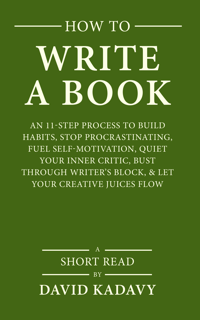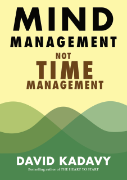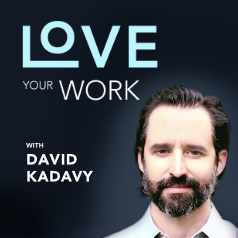Subscribe to blog updates via email »
Week of Want – Love Your Work, Episode 239
 Subject: “IMMEDIATE Action Reqeusted [sic]”
Subject: “IMMEDIATE Action Reqeusted [sic]”
They misspelled “requested,” which had the unintended effect of highlighting that this email was urgent.

WANT TO WRITE A BOOK?
Download your FREE copy of How to Write a Book »
(for a limited time)
There were some documents attached to the email. They wanted me to review the documents and sign them. Then, I would get a wire of money to my bank account – from Google, Inc.
Listen to the Podcast
- Listen in iTunes >>
- Download as an MP3 by right-clicking here and choosing “save as.”
- RSS feed for Love Your Work
I had no idea this email was coming. It was a nice surprise, since it was my birthday. It was all thanks to a decision I made three years prior.
Three years prior, I cleared my schedule and declared what I call a “Week of Want.” I gave myself an entire week to work on whatever I wanted. I had no plan at the time – that was the point of my Week of Want. Three years later, here I was getting a surprise paycheck, thanks to that Week of Want.
Creative work happens in “Extremistan”
What was happening was a Black Swan. A rare and unpredictable event – in this case, a positive one. If you made several copies of the universe, and repeated my decision from three years prior, in most of those parallel universes, I probably wouldn’t end up getting money wired to my bank account from Google.
That’s because creative work happens in Extremistan. Nassim Taleb introduced Extremistan in his book, The Black Swan. Extremistan is a world of Black Swans – rare and unpredictable events.
Creative work does not happen in “Mediocristan”
Other kinds of work happens in the opposite of Extremistan – what Taleb calls Mediocristan. Mediocristan is a world that’s stable and predictable.
Serving coffee is a good example of work that happens Mediocristan. There’s a steady supply of coffee, and a steady demand for coffee. If you get a job at Starbucks, they can more or less predict that supply and demand, as well as their overhead costs. So, they can pay you by the hour.
When your line of work is thinking of ideas and bringing those ideas into the world, you can’t get paid by the hour. Beyoncé does not get paid by the hour to make her music, even though she’s Beyoncé, and her next record is guaranteed to sell.
Much less is the world’s next Beyoncé getting paid by the hour. Nobody knows she’s the next Beyoncé. If you made copies of the universe, in many of those parallel universes, she wouldn’t even become the next Beyoncé.
You need clear priorities in Extremistan
When you’re working in a pure Mediocristan, you don’t even need priorities. You know exactly what needs to be done, and you do it.
When you’re working in Extremistan, you do need clear priorities. There are a million things you could do – a million things that might work – so you have to be ruthless with your priorities.
You have to be ruthless in what you say yes to and what you say no to, and in trying to find some way to objectively see what the results are so you can make better decisions in the future.
Clear priorities have a dark side
But clear priorities have a dark side. It’s that when you have clear priorities, you only put your money on the sure bets.
And when all of your money is on sure bets, you aren’t even gambling anymore. You’ve moved yourself from Extremistan to Mediocristan. You can keep steady paychecks coming, but you’ll never hit the jackpot.
So employ the Barbell Strategy
So how do you give yourself the opportunity to hit it big, without going bust? You need to spend some time in Extremistan.
Taleb calls it “The Barbell Strategy”: Imagine a barbell, with fat weights on the ends, and a thin bar in the middle. On one end of the barbell is your sure bets. If you’re investing, that’s treasury bills. On the other end of the barbell is your risky bets. If you’re investing, that might be options, or cryptocurrencies.
What you’re avoiding is the stuff in the middle. Don’t make big bets where you can lose your shirt, and avoid the seemingly-conservative investments in which you can actually lose a lot.
Give yourself a “Week of Want”
One way I spend time in Extremistan is by giving myself a “Week of Want.” In a week of want, I clear as much as I can from my schedule for a whole week, and I let myself explore whatever is interesting to me.
In 2012, after publishing my first book, I gave myself a Week of Want. I spent most of my week reflecting on the experience of writing that first book. Why did it seem nothing I had learned about productivity had prepared me to write that book?
I reflected on the grab-bag of rituals and routines I eventually developed to keep my writing process moving forward. I shared my thoughts in a blog post, called Mind Management (Not Time Management).
Nothing happened right away. That’s the nature of creative work. There’s often a delay before your bets pay off.
But another year and a half later, I got an email. The renowned behavioral scientist, Dan Ariely, had read my blog post, and wondered if I’d like to help him with a productivity app he was building.
Another year and a half after that, I got a surprise payday from Google. Google bought that productivity app.
The Week of Want is a way of “gambling with your time.” Dan Ariely himself talked about gambling with his own time back on episode 203. He’ll spend some amount of his time on things that don’t make sense, such as working with a cartoonist, or inviting a mentalist to perform at one of his speeches.
The Week of Want exposes you to “asymmetric opportunities,” like Tynan talked about on episode 145. Oftentimes we hold ourselves back from pursuing a silly idea. There’s very little downside to pursuing the idea, but the potential upside is unlimited.
Why “want?”
The Week of Want is a great way to make sure you spend a little time in Extremistan. But it has another valuable purpose, and that purpose lies in the idea of “want.”
When we’re spending all of our energy on what we feel we should do, we soon forget what we want to do.
But remember that creative work is unpredictable. Even when we think really hard about what we should do, a lot of the time we’re going to be wrong.
Additionally, the things we want to be doing are powerful. The things we want to be doing are the things we’re curious about. And curiosity is powerful in two ways.
One: Curiosity is motivational fuel. You can work harder on something you’re curious about.
Two: Curiosity is a path to originality. Your curiosity will lead you down multiple paths. When those paths converge, you’ll be where no one else has been.
Why a week?
You may recognize elements of the Week of Want in Google’s famous “twenty-percent time” strategy.
When Google was first starting out, they allowed their engineers to spend twenty percent of their time on whatever project they wanted. The strategy worked great. Some of Google’s best products were created during twenty-percent time – including Gmail and AdSense.
I’ve heard some people say that they spend one day a week on a side-project. Hey, that’s a good use of the barbell strategy, and it will expose you to positive Black Swans more than not working on a side project at all.
But there’s something special about spending an entire week doing whatever you want. Working on what you want to work on, and doing so for an entire week, takes you further and further from the norm. It brings you deeper and deeper into the territory where you’ll discover truly original ideas.
When I asked neuroscientist John Kounios – way back on episode 8 – about the benefits of taking an entire week to do what I want, he said there were two potential ways that could improve creative thinking.
One: Doing what you want improves your mood, which leads to better ideas. He explained, “It gives you pleasure, puts you in a positive mood, and it’s something you can sustain over the week – and then it can lead to creative insights.”
Two: Taking a whole week puts you in a deeper state of creativity. Dr. Kounios said that the “insightful state of mind is very fragile…. It’s easier to get into an analytical state of mind than it is to get into a creative, insightful, state of mind. So if you can create this whole block of time for a week, it allows you to really sink into that state.”
Week of Want rules
To do your own week of want, clear away as much as you can for a week. Act like you’re going on vacation. Set up the out-of-office autoresponder on your email.
Approach the Week of Want with no expectations as to what you’ll discover during that week. The goal of the Week of Want is much less about actually finding great ideas. It’s more about reconnecting with the feeling of wanting in the first place. We so regularly do the things we feel we should do, we soon forget what it feels like to want to do something at all.
Image: Insula Dulcamara, by Paul Klee
Mind Management, Not Time Management available for pre-order!
After nearly a decade of work, Mind Management, Not Time Management debuts October 27th! This book will show you how to manage your mental energy to be productive when creativity matters. Pre-order it today!
My Weekly Newsletter: Love Mondays
Start off each week with a dose of inspiration to help you make it as a creative. Sign up at: kadavy.net/mondays
Join the Patreon for (new) bonus content!
I've been adding lots of new content to Patreon. Join the Patreon »
Subscribe to Love Your Work
Listen to the Podcast
- Listen in iTunes >>
- Download as an MP3 by right-clicking here and choosing “save as.”
- RSS feed for Love Your Work
Theme music: Dorena “At Sea”, from the album About Everything And More. By Arrangement with Deep Elm Records. Listen on Spotify »


